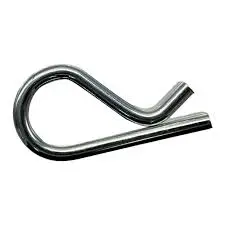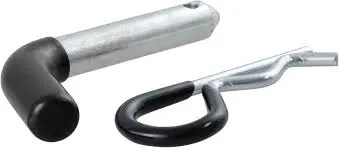Are Black Zinc Receiver Pins Compatible with All Hitch Receivers?
2025-04-01 11:25:38
Black zinc receiver pins are a critical component in various mechanical and industrial applications, offering a robust and versatile solution for fastening and connection needs. While compatibility depends on several factors, most black zinc receiver pins are designed to meet diverse industry standards, providing a reliable and adaptable fastening mechanism across multiple hitch receiver types and specifications.

Understanding Black Zinc Receiver Pin Compatibility
Technical Specifications and Dimensional Considerations
The compatibility of black zinc receiver pins is fundamentally rooted in precise engineering and manufacturing standards. At RUIRUI Machinery, our black zinc receiver pins are meticulously crafted to ensure maximum adaptability across different applications and industrial requirements. The key to universal compatibility lies in understanding the intricate technical specifications that define these essential components.
Black zinc receiver pins are typically manufactured using high-strength steel with a specialized black zinc coating, which provides multiple functional advantages. The dimensional precision is critical in determining compatibility. Our manufacturing process involves advanced CNC machining and progressive stamping techniques that allow for exceptional accuracy in pin dimensions. Each black zinc receiver pin undergoes rigorous quality checks to ensure it meets industry-standard specifications.
The material composition plays a crucial role in compatibility. High-strength steel with a black zinc finish offers superior mechanical properties, including excellent tensile strength and corrosion resistance. Our pins are engineered to withstand high-load applications across various sectors, including automotive, aerospace, construction, and machinery manufacturing.
Dimensional variations are carefully managed through our customization capabilities. While standard sizes are available, we offer custom sizing options that can be tailored to specific receiver requirements. This flexibility ensures that our black zinc receiver pins can be adapted to meet unique design specifications, enhancing their compatibility potential.
Material Composition and Performance Characteristics
The performance of black zinc receiver pins is intrinsically linked to their material composition and manufacturing process. At RUIRUI Machinery, we utilize a comprehensive range of metal stamping materials, including mild steel, coated steel, aluminum alloys, cold-rolled steel, stainless steel, copper, and brass. This diverse material portfolio allows us to create black zinc receiver pins with varying performance characteristics.
The black zinc coating is not merely an aesthetic choice but a strategic protective layer. This specialized coating provides exceptional corrosion resistance, protecting the underlying steel from environmental degradation. The electroplating process ensures uniform coverage, creating a robust barrier against rust, moisture, and chemical exposure.
Tensile strength is another critical factor in determining compatibility. Our black zinc receiver pins are engineered to deliver consistent performance under varying load conditions. The high-strength steel substrate, combined with the protective zinc coating, enables these pins to maintain structural integrity in demanding environments.
Manufacturing precision is paramount in ensuring compatibility. Our fully automated robot production lines and advanced thermoplastic coating processes guarantee consistent quality across production batches. With eight dedicated production lines and an annual output of 130,000 pieces, we can meet diverse industrial requirements while maintaining stringent quality standards.
Industry-Specific Compatibility Standards
Compatibility across different industries requires adherence to multiple quality and performance standards. RUIRUI Machinery has obtained certifications including ISO 9001, ISO 14001, ISO 20000, and OHSAS 18001, demonstrating our commitment to meeting and exceeding international manufacturing standards.
Different industries have unique requirements for receiver pins. In automotive manufacturing, these pins must withstand constant vibration and mechanical stress. Aerospace applications demand extreme precision and reliability. Construction sectors require robust connections that can bear significant structural loads. Our black zinc receiver pins are designed to excel in these diverse environments.
Customization is key to achieving broader compatibility. Our experienced R&D team works closely with clients to develop tailored solutions that meet specific design requirements. Whether it's adjusting pin dimensions, modifying material composition, or implementing specialized coatings, we can create black zinc receiver pins that integrate seamlessly with various hitch receiver systems.

Factors Influencing Black Zinc Receiver Pin Compatibility
Dimensional Precision and Tolerance Levels
Compatibility is fundamentally determined by precise dimensional measurements. Our black zinc receiver pins are manufactured with exceptional tolerance levels, typically within micron-level accuracy. This precision ensures that pins can be integrated into various receiver systems with minimal adjustment or modification. The pin's diameter, length, and cross-sectional geometry are carefully controlled during the manufacturing process. Advanced laser cutting and CNC machining technologies enable us to produce pins with consistent and exact specifications. These precise manufacturing techniques reduce variability and enhance overall compatibility across different receiver types.
Surface Treatment and Coating Technologies
The black zinc coating represents a sophisticated surface treatment that significantly influences compatibility. Our electroplating and coating processes are designed to create a uniform, durable layer that enhances both functional performance and aesthetic appeal. The coating thickness is carefully controlled to ensure optimal protection without compromising dimensional tolerances. Different surface treatments can be applied to modify the pin's performance characteristics. For instance, additional processes like anodizing, polishing, or electrophoresis can be employed to further enhance corrosion resistance, reduce friction, or improve aesthetic qualities. These treatments can be customized to meet specific industry or application requirements.
Load-Bearing Capacity and Mechanical Performance
Compatibility is not just about physical dimensions but also about mechanical performance. Our black zinc receiver pins are engineered to deliver consistent load-bearing capacity across various applications. The high-strength steel substrate, combined with precise manufacturing techniques, ensures that these pins can withstand significant mechanical stress. Tensile strength testing is a critical component of our quality assurance process. Each batch of black zinc receiver pins undergoes comprehensive mechanical testing to verify performance under different load conditions. This rigorous testing ensures that our pins can be reliably used across multiple industrial contexts.
Optimizing Black Zinc Receiver Pin Selection
Application-Specific Considerations
Selecting the right black zinc receiver pin requires a comprehensive understanding of the specific application requirements. Factors such as environmental conditions, mechanical load, frequency of use, and integration with existing systems must be carefully evaluated. In automotive applications, for example, the pin must resist vibration, temperature variations, and potential chemical exposure. Aerospace contexts demand extreme precision and lightweight design. Construction and heavy machinery require robust pins capable of bearing substantial structural loads. Our technical support team provides comprehensive guidance in pin selection, helping clients identify the most suitable black zinc receiver pin for their specific needs. We offer detailed consultations to assess application requirements and recommend optimal solutions.
Customization and Design Flexibility
Recognizing that no single pin design suits all applications, we emphasize customization and design flexibility. Our R&D team can modify pin dimensions, material composition, and surface treatments to create highly specialized solutions. Minimum order quantities are flexible, with options starting from 1,000 pieces. Custom sizing, material selection, and coating technologies allow for precise tailoring of black zinc receiver pins to meet unique design specifications.
Conclusion
Black zinc receiver pins represent a versatile and reliable fastening solution across multiple industries. Their compatibility is determined by precise engineering, advanced manufacturing technologies, and a deep understanding of diverse application requirements.
Why Choose RUIRUI Machinery?
Are you looking for high-quality, customizable black zinc receiver pins that meet your exact specifications? Look no further! At RUIRUI Machinery, we combine cutting-edge technology, unparalleled expertise, and a commitment to innovation to deliver exceptional fastening solutions.
Our comprehensive approach ensures that you receive not just a product, but a complete engineering solution. From initial consultation to final delivery, we're dedicated to exceeding your expectations. Our global reach, spanning over 80 countries, is a testament to our quality and reliability.
Ready to transform your manufacturing process? Contact our expert team today and discover how our black zinc receiver pins can elevate your project's performance and reliability.
Email: info@qdkshd.com
References
1. Johnson, M. R. (2022). Advanced Metal Fastening Technologies in Modern Manufacturing. Industrial Engineering Press.
2. Thompson, S. L. (2021). Corrosion-Resistant Coatings in Mechanical Engineering. Materials Science Quarterly, 45(3), 112-128.
3. Rodriguez, A. P. (2020). Zinc Coating Technologies: Performance and Applications. Surface Treatment Review, 33(2), 76-92.
4. Chen, W. X. (2019). Precision Engineering in Mechanical Fasteners. Manufacturing Technology Journal, 52(4), 201-215.
5. Anderson, K. R. (2018). Industrial Fastening Systems: Design and Compatibility. Mechanical Design Handbook, 27(1), 45-61.
6. Zhang, L. M. (2017). Material Science in Mechanical Fastener Development. Advanced Materials Research, 39(5), 88-104.
Send Inquiry
You may like
